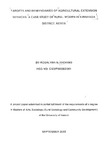Targets and beneficiaries of agricultural extension services: a case study of rural women in Kirinyaga District, Kenya

View/
Date
2003-09Author
Gichimo, Rosalynn N
Type
ThesisLanguage
enMetadata
Show full item recordAbstract
This is an exploratory study on Targets and beneficiaries of agricultural extension
services with a focus on rural women of Kirinyaga district in Kenya. The general
objective of carrying out this study was to find out the role of the present approach of
the agricultural extension system in providing services to rural women in Kirinyaga
district. Specific objectives were; to describe the existing approach of the agricultural
extension system in the area; to document sources of information for rural women in
Kirinyaga district; to analyse the difficulties encountered by extension providers in
dispensing their duties in the district; and to discuss the factors affecting access of
information for rural women in the district. This study relied on two sociological
theories/models namely the diffusion of innovation model and the field theory, which
argue that a person's socio economic status is highly related to his/her level of
contact with the change agent.Primary sources of data were rural women to whom a household survey questionnaire was administered. Key informants in the public and private sector of the extension system also provided information, which was gathered using an interview schedule. Secondary sources of data were also used. All these qualitative and quantitative data were combined, analysed and presented in the fourth chapter of this study.Major findings indicate that contrary to popular thought, women are more educated than previously held. Secondly, levels of income and education heavily influence what sources of crop information the women farmers turn to. Thirdly, it is evident that there is an attitude/relationship problem between extension workers, who are mostly male, and the women farmers. The back and forth visits, between these two
groups of people, suggesting an interaction, register a dismal frequency.
It is recommended that the retraining of extension personnel to get rid of the biases
they have towards women farmers is critical. The changes the government is
already instituting in the agricultural sector, by way of introducing different extension
approaches, can be lauded. However, more still needs to be done in recognition that
rural women farmers in Kenya need all the support in providing food for their
households and the country in general.
Citation
Masters of Arts Degree (Sociology)Publisher
University of Nairobi Department of Arts Sociology
Description
A project paper submitted in partial fulfilment of the requirements of a degree in Masters of Arts, Sociology (Rural Sociology and Community Development) at the University of Nairobi
